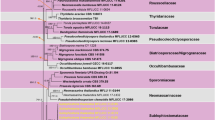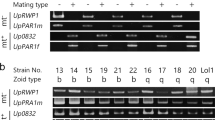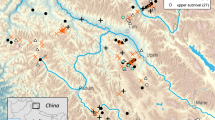Abstract
P. virginianum L. is the only representative of the P. vulgare complex which is known to occur on the eastern seaboard of North America. It has hitherto been regarded as a well-characterized species readily distinguishable from all others by the possession of a striking type of stellate paraphysis which has been intensively studied by Martens1 and his collaborator, who regard them as modified sporangia. The chromosome number has previously been reported by one of us to be diploid2.
This is a preview of subscription content, access via your institution
Access options
Subscribe to this journal
Receive 51 print issues and online access
$199.00 per year
only $3.90 per issue
Buy this article
- Purchase on Springer Link
- Instant access to full article PDF
Prices may be subject to local taxes which are calculated during checkout
Similar content being viewed by others
References
Martens, P., Bull. jard. bot. Brux., 17, 1 (1943). Martens, P., and Pirard, N., La Cellule, 49, 385 (1943). Pirard, N., La Cellule, 51, 155 (1947).
Manton, I., “Problems of Cytology and Evolution in the Pteridophyta” (Cambridge, 1950).
Manton, I., Nature, 167, 37 (1951).
Author information
Authors and Affiliations
Rights and permissions
About this article
Cite this article
MANTON, I., SHIVAS, M. Two Cytological Forms of Polypodium virginianum in Eastern North America. Nature 172, 410–411 (1953). https://doi.org/10.1038/172410a0
Issue Date:
DOI: https://doi.org/10.1038/172410a0
Comments
By submitting a comment you agree to abide by our Terms and Community Guidelines. If you find something abusive or that does not comply with our terms or guidelines please flag it as inappropriate.



